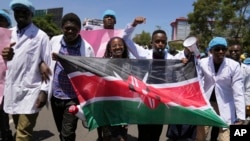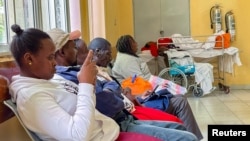Doctors at public hospitals downed their tools in mid-March over pay and working conditions, disrupting services for thousands of patients.
At the center of the row is a move by the government to slash the salaries of medical interns, who make up about 30 percent of doctors, according to the Kenya Medical Practitioners, Pharmacists and Dentists Union.
Labor court judge Byram Ongaya said the national doctors' union and the government must immediately convene a meeting "without conditions" and conclude "a written return-to-work formula not later than close of Friday."
The doctors earlier this month rejected an offer by the government that said it would meet some of the medics' demands, including hiring interns on permanent contracts and paying arrears due under a 2017 agreement.
The government has ruled out any further concessions, and a two-week ultimatum set by the labor court to end the stalemate lapsed without a deal on Wednesday.
Ongaya ruled that the parties must "negotiate in utmost good faith towards compromise and in the best interest of full resumption of health services."
He also ordered that the doctors' union ensure there were a set number of medics at all hospitals to handle emergencies as negotiations continue.
Kenya's leading Daily Nation newspaper on Wednesday reported that the standoff had led to a spike in deaths, with no specialists present at some hospitals offering cancer treatment.
Hundreds of patients are "paying with their lives" at home, in private hospitals and village dispensaries, it said.
Strikes over working conditions in public hospitals are common in Kenya and often leave a trail of suffering.
In 2017, doctors staged a 100-day nationwide strike that left public hospitals shut.
Dozens of patients died from a lack of treatment during that walkout, which ended after a collective bargaining agreement was reached.
But doctors have accused the government of reneging on some parts of the deal, leading to the current strike.








Forum